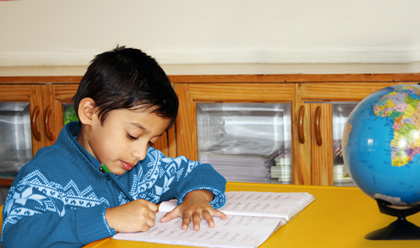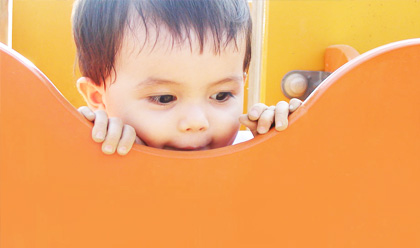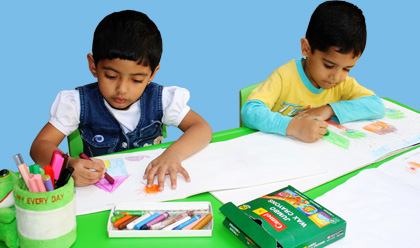|
|
|
|
|
|
|
 |
 |
|
|
|
|
|
 |
|
 |
|
|
We at LEA follow the inquiry-based learning methodology. |
|
|
|
|
|
|
|
|
|
|
In Inquiry based learning, the learner (student) is mainly involved and the instructor leads him to understand the concept. Inquiry here implies on the possessing skills and attitude of the students, which allows them to ask questions about new resolutions and issues while they are gaining new information.
Inquiry: seeking knowledge, information, or truth through questioning.
Our traditional ways of teaching is information based and discourages the process of inquiry. It makes the student get less prone to asking questions as they move through their grade levels, they are just expected to listen and repeat the expected answers. This is due to the lack of understanding of inquiry based learning. Inquiry based learning is not just asking questions, but it is a way of converting data and information into useful knowledge. A useful application of inquiry based learning involves many different factors, which are, a different level of questions, a focus for questions, a framework for questions, and a context for questions.
Following this approach, young minds at LEA are seen as independent thinkers and communicators who are provided with opportunities to extend, communicate, discuss and challenge their thinking. The curriculum encourages children to understand concepts by asking questions, discussing in class with their peers, work on problems independently and in groups, build and present their understandings of the situations taking examples from the real world challenges at each grade level.
Our teaching approach acknowledges that as human society evolve; we need to collaborate more with our peers, our family and other people whom we know, meet and help us. The success of this collaboration will be reflected in the success of individual in all spheres of life. The basic qualities like healthy competition, meaningful collaboration, compassion for fellow beings, integrity etc need to be inculcated in the young minds using the right mix of individual and group activities at every age group by providing them a positive environment in school.
The class activities are designed in a fashion which tries to imbibe these basic traits: |
|
Curriculum and teaching methodology
Skills oriented Vs Content oriented
Traditional teaching methods focus on the students cramming the facts just for the purpose of writing the answers in the examinations. This traditional technique relies on giving a set of probable questions and answers to the child to memorize. This method fails to appreciate the fact that they don’t teach how to approach the problem given a real scenario if this does not match a text book problem. At LEA we follow skills based teaching methodology which encourages students to ask questions and they learn the basic approach to solve a problem which is useful in any scenario and not just solving text book questions.
Student centred Vs Teacher Centred
In a traditional teacher centered method the teacher delivers the content and students note it down without much questioning and many times without understanding for the purpose of writing it in examinations. In student centric approach followed in LEA, the content is delivered in phased manner as to arouse the curiosity among students. Students are encouraged to ask question to understand the concept thoroughly. Academic studies have indicated that learning through questioning and answering in classroom is one of the best methods of learning and sharpens the focus of students in classroom environment.
Inquiry based Vs Exam based
Teaching by traditional method focuses a lot on examination. It depends on what questions are being taught in the class and how well student answers those questions in examinations. In inquiry based learning the stress is on learning the concept behind an idea or topic rather than focusing on a set of questions given/asked on an idea or topic. If the concept behind an idea and its application is well understood, there is no need to memorize answers for sake of jotting them down in the examination, they can be answered on basis of how well the concept and its application is understood.
Customized model of learning Vs One-size-fits-all model of teaching
Each individual has different way as well as different pace of learning things. In traditional schools all the students go through the subject at the same pace even though few may be lagging behind or some may be ahead of others. Here customized model of learning is helpful as different students have different pace of learning. We at LEA follow different learning levels for the same grade level knowing that one-size fits-all model is not applicable. The assignments are designed with utmost care so that they are challenging for individual student in a given class to have interest in learning the concept. LEA provides the best environment and encouragement for the child to understand but the basic effort should be put in by the child.
|
| • |
Importance of completion of individual tasks assigned to them
Take on the challenges and solving them independently
Develop their language, analytical and numeral skills
Develop their socializing skills with different group activities |
| • |
| • |
| • |
|
Little Explorer’s Academy is a new age educational institution that focuses on a inquiry-based, skills-oriented, student-centred, customized model of learning as opposed to the traditional model education which is examination-based, content-oriented, teacher-centred, one-size-fits-all solution. |
|
|
|
 |
|
 |
|
 |
|
|
|
 |
|
 |
|
|
Eager for knowledge; intellectually curious |
|
|
|
|
|
|
Pre-primary
For pre-primary group, we emphasize on three core areas for skills development:
1. Interpersonal skills development
2. Intrapersonal skills development
3. Psychological development
We at Little Explorer’s Academy take immense care in designing activities for the kids of different age groups. The whole module is segregated into phases starting from some practical life exercises which requires body and mind coordination like cloth folding, eating food themselves, block joining, matching the related pictures etc. and step by step progressing to a pattern of formal studies like Language & Arithmetic. LEA apart from regular teaching also follows various learning activities to evoke fine and gross motor skills in kids for their overall personality development, some of the activities are listed:
Concept Learning
At LEA we follow a certain concept through which the children are taught various activities. A particular concept is chosen and everything related to that concept is taught to kids through games and other activities. For example concept of healthy living, kids are told everything related to be healthy like hygiene, exercising, healthy food etc. This activity helps in imparting general knowledge to kids in a fun loving way.
Scribbling
Through scribbling, a kid has its first brush with drawing. At LEA have provided boards wherein a child can do scribbling. This educational activity gives his/her a sense of importance even while developing eye-hand coordination.
Role Enacting
Children love to do what adults do. So taking advantage of this fact, at LEA we have activities wherein we lay before the kids toys of all the items that are used at home, for example kitchen appliances, gardening kits, doctor kit etc. Through these educational kits, we teach the kids the various concepts behind these items. |
|
This learning activity helps the children as they tend to see these items being used at home and the concepts get emphasized even further, thus widening their learning horizons.
Playing with Blocks
Blocks come an excellent play school educational activity because blocks help children learn various colors, shapes, dimensions even as they begin to understand what towers are or what buildings or cars or roads are. Besides this, blocks help children understand what balancing, shapes, patterns, are all about. We have different kinds of block games wherein kids apply their own logic to come out with some meaningful structure.
Displaying Kid’s Activities
Nothing can encourage a child more than praises, so we display various activities done by the children like- coloring sheets, paper dabbing sheets, patterns made through hand prints, etc. The display of activity make the children feel important and noticed.
Music and Song Activities (Rhymes & moral story telling)
At LEA we teach songs and nursery rhymes along with story-telling. These music and song activities are done through CD’s and group activities. These activities ignite energy in the children and help them learn things faster.
Art & Craft work
Craft and art work helps to invoke creativity, imagination and observation in kids. At LEA we encourage kids to do different kinds of art and craft activities like paper craft, clay modeling etc. Through these activities we make them learn different kinds of textures. These activities help to make them innovative and creative.
Logical & Reasoning games
At LEA we have many mind tickling games and exercises like matching the related words & pictures, identification of missing parts etc. These activities help kids to think logically which is very useful for developing their reasoning skills. |
|
|
|
 |
|
 |
|
 |
|
|
|
|
|
|
 |
|
 |
|
|
Eminence, merit, virtue |
|
|
|
|
|
|
|
|
Grade 1st to 8th
LEA will be following NCERT/CBSE syllabus in the primary school. The focus of primary school will be on different areas of development as language building, reading readiness, arithmetic and analytical skills. Many kids join from different play schools in class 1st which follow different syllabi. So the curriculum of class 1st is designed in a way that ensures that kids joining us after completing UKG start seamlessly. The children in primary classes go through orientation classes for first three weeks to make them adept to teaching methodology and then instructors gently guide them to start on regular academic activities. In primary classes the focus is on core subjects like english, sciences, mathematics, fine arts and physical education. The primary school targets to build strong foundation for self study to ensure smooth sailing through middle and high school. Apart from academics (which is done through work-sheets and projects), we make sure students participate in extracurricular activities to have all round development from early years.
The curriculum consists of work sheets based on syllabus for the class with the difficulty level increasing gradually over the academic session. Appropriate weightage is given to continuous evaluation (out of total) which uniformly distributes the academic load across the full year session.
English curriculum
English curriculum is central to the development program in primary classes. Reading, writing, speaking and comprehension are essential basic language skills for the students and most important development area for primary classes. To aid in developing language skills we follow host of activities like book reading, poetry/songs recitation, story-telling, role play, short story writing etc. As our teaching methodology stresses on classroom discussions for learning concepts, this in itself will be the best means for their language development.
Mathematics curriculum
Mathematics in primary classes is more of solving practical problems in day to day life. These include concept of numbers, time, measurement, fractions, shapes etc. To make children learn and appreciate these basic mathematical concepts, best way is to help them in solving problems related to these concepts. We follow the approach just outlined for teaching mathematics in primary classes.
Firm grounding in these basic mathematical concepts learnt in primary classes form the basis of understanding the higher concepts like logical thinking in middle and high school.
Sciences curriculum
The areas covered in this category relate to study of basic natural sciences and social sciences.
Social science is related to the community we live in and our |
|
role in society as a whole. As part of social science curriculum, we emphasize on the importance of individual in the society as a whole and his rights and duties as an individual. These concepts will help young minds grow as socially conscious and responsible citizens.
For science part, it is more to do with the observation of surroundings by children, of experimenting in lab and hypothesizing to understand the universe and its laws. Children spend quality time in lab trying to understand the basics of natural science. To understand mother earth and nature by studying natural phenomena and living things around us form integral part of science curriculum.
Information Technology
Computing devices are omnipresent nowadays. After all we are living in a computer age!!
We start quite early in primary classes on making them familiar with computers and teach them how to use its basic functionality. By end of primary years in school, students will be able to make documents, presentations, run simple programs, surf the internet and find help online for their project related works. Computers are also be used by children to play games and puzzles such as jigsaw, pattern matching and team games which sharpens their analytical and cognitive skills.
Physical Education
Physical education at LEA consists of spending time playing sports and doing physical activity under supervision of an instructor. Lot of interactions happens while kids are engaged in team sports. Sports play an important part in personality development of young ones as they learn from each other, adapt to varying situations and make strategies while playing in a group. Sports enhance innate leadership qualities and children learn the spirit of life is not just winning but participation is equally important.
Apart from sports, we have yoga and meditation classes on regular basis which help them lead a holistic stress free life filled with spiritual energy.
Fine Arts
Fine arts activities like art, music and dramatics are integral part of curriculum at LEA. We encourage children to participate in these activities as it helps them expressing their creativities in new forms. There are regular sessions for kids to perform these activities and work of art by students is displayed on class/school notice boards for their encouragement.
By following these well researched, modern teaching methodologies and best practices to aid in learning, we aim to be among the best schools in Bangalore. |
|
|
|
 |
|
 |
|
 |
|
|
|
|
|
|
|





